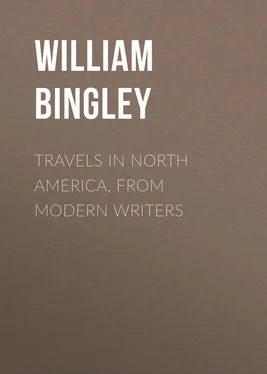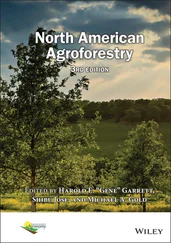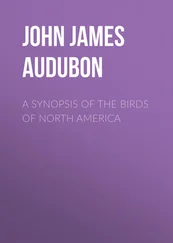William Bingley - Travels in North America, From Modern Writers
Здесь есть возможность читать онлайн «William Bingley - Travels in North America, From Modern Writers» — ознакомительный отрывок электронной книги совершенно бесплатно, а после прочтения отрывка купить полную версию. В некоторых случаях можно слушать аудио, скачать через торрент в формате fb2 и присутствует краткое содержание. Жанр: foreign_antique, foreign_prose, Путешествия и география, на английском языке. Описание произведения, (предисловие) а так же отзывы посетителей доступны на портале библиотеки ЛибКат.
- Название:Travels in North America, From Modern Writers
- Автор:
- Жанр:
- Год:неизвестен
- ISBN:нет данных
- Рейтинг книги:3 / 5. Голосов: 1
-
Избранное:Добавить в избранное
- Отзывы:
-
Ваша оценка:
- 60
- 1
- 2
- 3
- 4
- 5
Travels in North America, From Modern Writers: краткое содержание, описание и аннотация
Предлагаем к чтению аннотацию, описание, краткое содержание или предисловие (зависит от того, что написал сам автор книги «Travels in North America, From Modern Writers»). Если вы не нашли необходимую информацию о книге — напишите в комментариях, мы постараемся отыскать её.
Travels in North America, From Modern Writers — читать онлайн ознакомительный отрывок
Ниже представлен текст книги, разбитый по страницам. Система сохранения места последней прочитанной страницы, позволяет с удобством читать онлайн бесплатно книгу «Travels in North America, From Modern Writers», без необходимости каждый раз заново искать на чём Вы остановились. Поставьте закладку, и сможете в любой момент перейти на страницу, на которой закончили чтение.
Интервал:
Закладка:
Independently of its soil, Utica has great advantages of situation; for it is nearly at the point of junction betwixt the waters of the lakes and of the Atlantic.
With Utica commences a succession of flourishing villages and settlements, which renders this tract of country the astonishment of travellers. That so large a portion of the soil should, in less than twenty years, have been cleared, brought into cultivation, and have acquired a numerous population, is, in itself, sufficiently surprising; but the surprise is considerably increased, when we consider the character of elegant opulence with which it every where smiles on the eye. Each village teems, like a hive, with activity and employment. The houses, taken in the mass, are on a large scale; for (except the few primitive log-huts that still survive) there is scarcely one below the appearance of an opulent London tradesman's country box. They are, in general, of wood, painted white, with green doors and shutters; and with porches, or verandas, in front.
The travellers passed through Skaneactas , a village, pleasantly situated, at the head of the lake from which it is named. They then proceeded to Cayuga , which, besides its agreeable site, is remarkable for a bridge, nearly a mile in length, over the head of the Cayuga lake: it is built on piles, and level. Betwixt Cayuga and Geneva is the flourishing little village of Waterloo , formed since the battle so named. Geneva contains many elegant houses, beautifully placed, on the rising shore, at the head of the Geneva lake.
From Geneva to Canandaigua , a tract of hill and vale extends, for sixteen miles, and having (within that space) only two houses. Canandaigua is a town of villas, built on the rising shore of the Canandaigua lake . The lower part of the main street is occupied by stores and warehouses; but the upper part of it, to the length of nearly two miles, consists of ornamented cottages, tastefully finished with colonnades, porches, and verandas; and each within its own garden or pleasure-ground. The prospect, down this long vista, to the lake, is peculiarly elegant.
From Canandaigua the travellers turned from the main road, nine miles, south-west, to visit what is called " the burning spring ." On arriving near the place, they entered a small but thick wood, of pine and maple-trees, enclosed within a narrow ravine. Down this glen, the width of which, at its entrance, may be about sixty yards, trickles a scanty streamlet. They had advanced on its course about fifty yards, when, close under the rocks of the right bank, they perceived a bright red flame, burning briskly on the water. Pieces of lighted wood were applied to different adjacent spots, and a space of several yards in extent was immediately in a blaze. Being informed by the guide that a repetition of this phenomenon might be seen higher up the glen, they scrambled on, for about a hundred yards, and, directed in some degree by a strong smell of sulphur, they applied their match to several places, with similar effect. These fires continue burning unceasingly, unless they are extinguished by accident. The phænomenon was originally discovered by the casual rolling of lighted embers, from the top of the bank, whilst some persons were clearing it for cultivation; and, in the intensity and duration of the flame, it probably exceeds any thing of the kind that is known.
Rochester stands immediately on the great falls of the Genesee, about eight miles above its entrance into lake Ontario. When Mr. Hall was here, this town had been built only four years, yet it contained a hundred good houses, furnished with all the conveniences of life; several comfortable taverns, a cotton-mill, and some large corn-mills. Its site is grand. The Genesee rushes through it, over a bed of limestone, and precipitates itself down three ledges of rock, ninety-three; thirty, and seventy-six feet in height, within the distance of a mile and a half from the town. The immediate vicinity of Rochester is still an unbroken forest, consisting of oak, hickory, ash, beech, bass, elm, and walnut-trees. The wild tenants of the woods have, naturally, retired before the sound of cultivation; but there are a few wolves and bears still in the neighbourhood. One of the latter had lately seized a pig close to the town. Racoons, porcupines, squirrels black and grey, and foxes, are still numerous. The hogs have done good service in destroying the rattlesnakes, which are already becoming rare. Pigeons, quails, and blackbirds abound. At Rochester, the line of settled country, in this direction, terminates; for, from this place to Lewistown, are eighty miles of wilderness.
The traveller, halting on the verge of these aboriginal shades, is inclined to pause in thought, and to consider the interesting scenes through which he has been passing. They are such as reason must admire, for they are the result of industry, temperance, and freedom. Five or ten, or, at the utmost, twenty years before Mr. Hall was in America, where there are now corn-fields, towns, and villages, the whole country was one mass of forest.
Notwithstanding the bad state of the roads, the stage-waggon runs from Rochester to Lewistown in two days. This journey is so heavy, that it is sometimes necessary to alight, and walk several miles, or to suffer almost a dislocation of limbs, in jolting over causeys or logged roads, formed of pine, or oak-trees, laid crossways. At different intervals, square patches seem cut out of the forest, in the centre of which low log-huts have been constructed, without the aid of saw or plane; and are surrounded by stumps of trees, black with the fires kindled for the purpose of clearing the land.
Lewistown was one of the frontier villages burnt during the last war, to retaliate upon the Americans for the destruction of Newark. It has, however, been since rebuilt, and all the marks of its devastation have been effaced. It is agreeably situated, at the foot of the limestone ridge, on the steep bank of the river St. Lawrence, which here rushes, with a boiling and eddying torrent, from the falls to Lake Ontario. Lewistown, notwithstanding its infancy, and its remote situation, contains several good stores.
Queenston , on the opposite side of the river, stands in the midst of corn-fields and farm-houses; a rare and interesting sight in Canada. It is built on the river's edge, at the foot of the heights. Before the late war it was embosomed in peach-orchards; but these were all felled, to aid the operations of the English troops. The heights are still crowned by a redoubt, and by the remains of batteries, raised to defend the passage of the river. It was near one of these that Sir Isaac Brocke was killed, on the 13th of October, 1812, while, with four hundred men, he gallantly opposed the landing of fifteen hundred Americans, the whole of whom were afterwards captured by g\General Sheaffe.
From Queenston Mr. Hall proceeded to York , a town within the British territory, situated on the north-western bank of lake Ontario. The country through which he passed abounded in game of various kinds. From the head of the lake it was, however, less varied than on the Niagara frontiers; and, for many miles, it was an uniform tract of sandy barrens, unsusceptible of culture.
York, being the seat of government for Upper Canada, is a place of considerable importance in the eyes of its inhabitants. To a stranger, however, it presents little more than about one hundred wooden houses, several of them conveniently, and even elegantly built; one or two of brick. The public buildings were destroyed by the Americans.
From York, Mr. Hall went, through the little town of Ancaster , to visit a Settlement of Mohawk Indians , on the banks of the Grand River . In the American war the Mohawks were strongly attached to the British interest, and first followed Sir William Johnson in Canada, under their chieftain, a celebrated warrior, whose name was Brandt. This man accustomed his people to the arts of civilized life, and made farmers of them. He built a church, and himself translated one of the gospels into the Mohawk language. His grave is to be seen under the walls of his church. The son of this extraordinary Indian is now living, and is a fine young man, of gentlemanly manners and appearance: he both speaks and writes the English language with correctness; and he dresses nearly in the English fashion. Brandt left also a daughter, who is living, and who would not disgrace the fashionable circles of Europe. Her face and person are fine and graceful: she speaks English, not only correctly, but elegantly; and, both in her speech and manners, she has a softness approaching oriental languor. She retains so much of her national dress as to identify her with her people; over whom she affects no superiority, but with whom she seems pleased to preserve all the ties and duties of relationship. She held the infant of one of her relations at the font, on the Sunday that Mr. Hall visited the church at Ancaster. The usual church and baptismal service was performed by a Dr. Aaron, an Indian, and an assistant priest; the congregation consisted of sixty or seventy persons, male and female. Many of the young men were dressed in the English fashion, but several of the old warriors came with their blankets, folded over them; and, in this dress, with a step and mien of quiet energy, they forcibly reminded Mr. Hall of ancient Romans. Some of them wore large silver crosses, medals, and other trinkets, on their backs and breasts; and a few had bandeaus, ornamented with feathers. Dr. Aaron, a grey-headed Mohawk, had touched his cheeks and forehead with a few spots of vermilion, in honour of Sunday: he wore a surplice, and preached at considerable length; but his delivery was unimpassioned and monotonous.
Читать дальшеИнтервал:
Закладка:
Похожие книги на «Travels in North America, From Modern Writers»
Представляем Вашему вниманию похожие книги на «Travels in North America, From Modern Writers» списком для выбора. Мы отобрали схожую по названию и смыслу литературу в надежде предоставить читателям больше вариантов отыскать новые, интересные, ещё непрочитанные произведения.
Обсуждение, отзывы о книге «Travels in North America, From Modern Writers» и просто собственные мнения читателей. Оставьте ваши комментарии, напишите, что Вы думаете о произведении, его смысле или главных героях. Укажите что конкретно понравилось, а что нет, и почему Вы так считаете.












